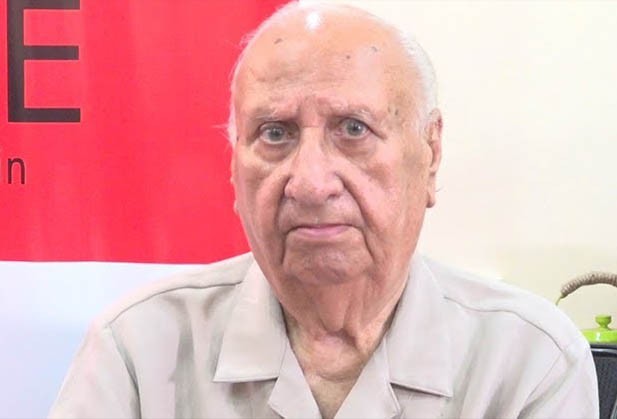
Interview of Nand Kishore Vikram

90-year-old veteran writer Nand Kishore Vikram is still busy in creative activities and was in Lahore in the first week of February 2019 to participate in International Conference on Punjabi & Peace, organised by World Punjabi Congress. He has written or edited about 100 books.
Nand Kishore Vikram was born on September 17, 1929 in Rawalpindi district. After 1947, his family migrated to India and settled in Ambala. A Hindu by religion (Hussaini Brahman), he got education in different schools because his father moved from one city to another due to his job.
A member of Communist Party of India (CPI), he was also an active worker of ‘Anjuman Taraqi Pasand Musanfeen’ (Progressive Writers Association, PWA).
The 1947 massacre left an indelible mark on the young mind -- he saw killings of Hindus, Sikhs and Muslims. Once he was travelling to Kanpur by train and some Hindu extremists, presuming him to be a Muslim, wanted to kill him but he showed them ‘Om’ tattoo etched on his hand that saved his life. In the same compartment, a poor Muslim man was stabbed and his body was thrown out of the moving train. His cries still haunt him.
He started writing poetry in school days, but later concentrated on short stories and prose. He writes in Urdu, Hindi and English.
In 1949, he joined daily Qaumi Akhbar and Amrit. He also published progressive magazine Irtiqa and a Hindi magazine Nai Kahani. These magazines stopped publications after bringing out a few editions.
When he was working in Press Information Department (PDI), he started publishing Urdu magazine Alami Urdu Adab. Since 1986, it has brought special issues on Habib Jalib, Devendera Fadnavis who formed Slum Rehabilitation Authority, Ahmed Nadeem Qasmi, Ali Sardar Jafri, Ashfaq Ahmad, Gopi Chand Narang, Kashmiri Lal Zakir, Mohammad Hasan Askari and many others.
His magnum opus Bhule Bisre Mujahideen carries life sketches of freedom fighters. He also worked as assistant editor of monthly Aaj Kal.
He was inspired by his grandmother (nani) who brought him up after the death of his mother. Born in a Hindu family, he is secular and humanist.
Following are excerpts of his interview with TNS
The News on Sunday: What are the basic themes of your short stories and novels?
Nand Kishore Vikram: The basic theme of my writings has been ‘partition’ of 1947.
TNS: Why 1947?
NKV: The first to migrate was Prophet Ibrahim, but the 1947 migration was biggest, most tragic and bloody in human history in which more than ten million people migrated and more than one million died. In one of my short stories Sarhad Paar, I got warning from the Indian government although it did not ban it. It was about a Pagal (madman) who would go to the border and shout that there is oppression in Pakistan/India.
TNS: What else is the theme of your writing?
NKV: The mystery of death and spirit always haunted me. There are different explanations about death and spirit in different religions. Hindu believes that spirit comes back while Islam has a different point of view. There are eighteen chapters of Geeta. I have written a book Unseewaan Adhahai (19th Chapter) on this topic.
TNS: How the idea of writing Bhule Bisre Mujahideen came to you?
NKV: As a student, I had met leaders of the freedom movement. My family was in Congress. I found most of the people were familiar just with a few names and many were unknown or unsung freedom fighters. In order to introduce them to younger generations, I wrote about them and it became very popular. Dada Amir Haider’s struggle always inspired me.
TNS: Please tell us about your magazine Alami Urdu Adab?
NKV: It is a bi-annual magazine published in a book form and the first special issue was on Habib Jalib. I also organised a function on the death of Habib Jalib at Constitutional Avenue, Delhi. I also brought out special issues on Amir Khusro and Munir Niazi, besides producing special issues on the ‘Hundred years of Indian Cinema’.
TNS: Which writers inspired you the most?
NKV: I was inspired by Prem Chand and Krishan Chandar. People read Saadat Hasan Manto for pleasure. All works of Manto are printed in Hindi and other languages of India. Had Manto been alive, he would have become very rich. Both India and Pakistan produced films on Manto, but the Indian film is far better.
TNS: How do you look at the rise of BJP (Modi) in India?
NKV: RSS and Hindu Mahasabha were active in subcontinent when Muslim League demanded the creation of Pakistan. Had there been no division, India would have Muslim prime ministers and presidents. The population of Muslims in united India would have been 700 million and nobody could ignore them.
TNS: How do you perceive friendship and peace between India and Pakistan and how do you feel being in Pakistan?
NKV: This is not my first visit to this country. I consider Pakistan as my home. I have spent many nights in my native village on my previous visits and I loved it. Let me tell you frankly my desire is that there should be a loose confederation between India, Pakistan and Bangladesh.